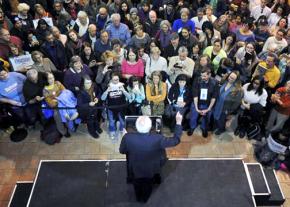Stuck inside the machine
With Election 2016 finally lurching to an end, SocialistWorker.org writers collaborate on a guide to what to look for on Election Day and in the days to come. Here, makes the case that Sanders' campaign played a time-honored role for the Democrats.
This evening, be sure to follow SW's live coverage as the results roll in during Election Night, at our Facebook page or on the Election Night journal.
ONE OF the more positive developments of the dispiriting 2016 presidential election was the mass support and enthusiasm that a self-described socialist attracted in the campaign for the Democratic presidential nomination.
For a time, it seemed that Vermont Sen. Bernie Sanders, in challenging the coronation of Hillary Clinton in the Democratic primaries, was defining the political terrain of the election, at least in part, with a strong left-wing message to counter Donald Trump's scapegoating right-wing populism.
But with the election slouching toward its conclusion on Tuesday, it was difficult to detect any trace of the Bernie Sanders campaign in the general election debate.
This was exactly what the Democratic Party leadership wished for when Sanders announced in spring 2015. It hoped the Sanders campaign would energize people that Hillary Clinton couldn't. He'd have his time on the public stage--preferably not too much time, nor at too loud a volume--and move into the wings, yielding the spotlight solely to Clinton.

But Sanders proved more popular than anyone, including probably himself, ever expected. He ultimately got over 2 million votes from people under 30--more than Clinton and Trump combined.
The party establishment had to get more aggressive. Revelations from hacked Democratic National Committee (DNC) e-mails released by WikiLeaks demonstrated that the supposedly "neutral" DNC used all kinds of tactics to wire the process in favor of Clinton.
The Wikileaks e-mails also proved that all of the criticisms Sanders leveled against Clinton in the first half of the year--that she was in the pocket of Wall Street banks, that her rhetorical opposition to the Keystone XL pipeline was opportunistic, that the primary system was fixed against him, among others--were more correct than he even knew.
But these revelations have barely dented the national political conversation during the general election campaign.
This is partly because the media obsession with "horserace" coverage of the Trump-Clinton contest pushed coverage of the e-mails to the side. But the more important explanation is that Sanders himself refused to make them an issue.
SocialistWorker.org writers tell you what to look for on Election Day and what to expect in the days to come.SW guide to Election Day
"The job of the progressive movement now is to look forward, not backward," Sanders said in a statement to NBC News. "No matter what Secretary Clinton may have said years ago, behind closed doors, what's important today is that millions of people stand up and demand that the Democratic Party implement the most progressive platform in the history of our country."
THIS SHOWED more clearly than anything else that Sanders belongs to a long history of "insurgent" campaigns inside the Democratic Party that eventually accept the candidate promoted by the party establishment and the limitations of a loyal opposition within.
With Eugene McCarthy's run against Lyndon Johnson in 1968, Jesse Jackson's "Rainbow Coalition" campaigns of the 1980s or Dennis Kucinich's antiwar candidacies during the George W. Bush years, the challenger each time might have won the "hearts and minds" of the most committed Democratic partisans. But in the end, they were loyal soldiers in helping to herd their supporters behind the establishment choice.
Far from helping to popularize "progressive" issues during the general election, Sanders' support for electing Clinton helped the candidate marginalize any lingering commitment to them.
For most of the time since the Democratic convention, Clinton tailored her appeals to middle-of-the-road voters, including "moderate" Republicans repelled by Trump's vulgarity and worried that his election would damage the U.S. image overseas.
Needless to say, a strategy of wooing suburban Republicans didn't foreground issues of class and racial inequality in the U.S. So Sanders was there at various events to assure Democratic "base" voters that Clinton really was committed, despite all the evidence to the contrary, to implementing what he claimed was the lasting achievement of his campaign: "the most progressive Democratic platform in history."
The disconnect between the issues that most voters care about and the imperatives of down-and-dirty electioneering came into sharp relief in October when Sanders was part of several political events in Colorado.
Sanders appeared at two rallies on successive days. One was alongside liberal Massachusetts Sen. Elizabeth Warren to boost the Clinton campaign specifically.
The next day, Sanders attended a separate rally to support a state initiative for single-payer health care. Guess who wasn't there? That's right: neither Clinton, nor the state's Democratic governor, nor that renowned liberal champion, Elizabeth Warren--because all these Democrats won't support an issue that Sanders made a centerpiece of his campaign.
During the primaries, Sanders played an important role in giving voice to the widespread desire for an alternative to the status quo. But his role ever since has been to keep the discontent he mobilized earlier this year harnessed to the project of electing Hillary Clinton.


